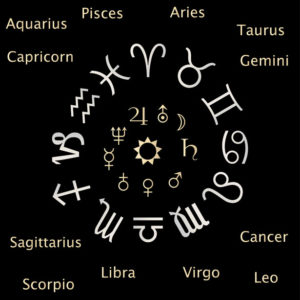Although many people of faith consult astrological charts, especially in India (where centuries ago Vedic Astrology developed in some predominantly Hindu communities), astrology itself does not always constitute part of a formal religious belief system. The issue of whether any relationship even exists between religion and astrology still creates controversy in some discussion forums.
Astrology vs Astronomy
The Dictionary of Cultural Literacy, a reference tool published by Houghton Mifflin Company in 1988, carefully distinguishes astrology from astronomy, a recognized field of scientific study. The text defines the term “astrology” on page 30 in the following terms:
“[a] study of the positions and relationships of the SUN, MOON, STARS, and PLANETS in order to judge their influence on human actions.”
An impressive tradition of astrological consultation characterizes human history – perhaps since prehistoric times?
For example, during the centuries prior to the development of the Roman Empire, astrologers in ancient city-states on the Indian Subcontinent and in China, Babylonia, Sumeria, Persia, Greece, and no doubt many other places as well, routinely consulted the heavens. These early stargazers helped found the science of Astronomy, which traces its roots back to a very ancient period in human history.
 Several observations support the notion that a distinction exists between religion and astrology. Here are just a few reasons:
Several observations support the notion that a distinction exists between religion and astrology. Here are just a few reasons:
First, the roots of astrology extend across a wide array of different cultural and religious traditions; no single one holds an exclusive claim to expertise in the subject.
For instance, some ancient Greek and Roman observers linked popular myths and legends to specific constellations. The famous Victorian astrologer Alan Leo in his classic work entitled The Art of Synthesis claimed that the Roman goddess Diana, the Chaldean goddess Astarte and the Egyptian goddess Isis all held connections in the view of ancient peoples with the crescent moon, for example. (See p. 45 of the 6th edition published by the Astrologer’s Library, New York).
The Planets
Although the vast majority of data about planets in the solar system has been obtained by scientists during recent centuries, following the invention of the telescope, it seems significant that planets bearing the names of ancient Roman deities include: Mercury, Venus, Mars, Jupiter, Saturn, Neptune, Uranus and Pluto. Yet many of these same planets also figure prominently in astrology charts developed from various other cultural traditions as well. Likewise, in the Western Hemisphere, some Native American tribes reportedly tied specific items of tribal cultural lore to particular star formations (these connections differed widely sometimes).
So it appears that many different cultures around the world forged links between the stars and spiritual topics.
Astrological traditions
Second, astrological knowledge sometimes differs significantly from one astrological tradition to another. A chart created using Western astrological principles or Chinese Astrology or Indian Astrology may depend upon the same planetary movements, yet the diverse systems of divination (or prediction) sometimes diverge in several important respects. Apparently, people can employ different astrological traditions to obtain useful information.
Both of these points suggest that people around the world have found merit in consulting astrology for centuries, yet any connection between astrological studies and religion must necessarily remain highly subjective because no single astrological tradition enjoys an exclusive claim to the topic.






